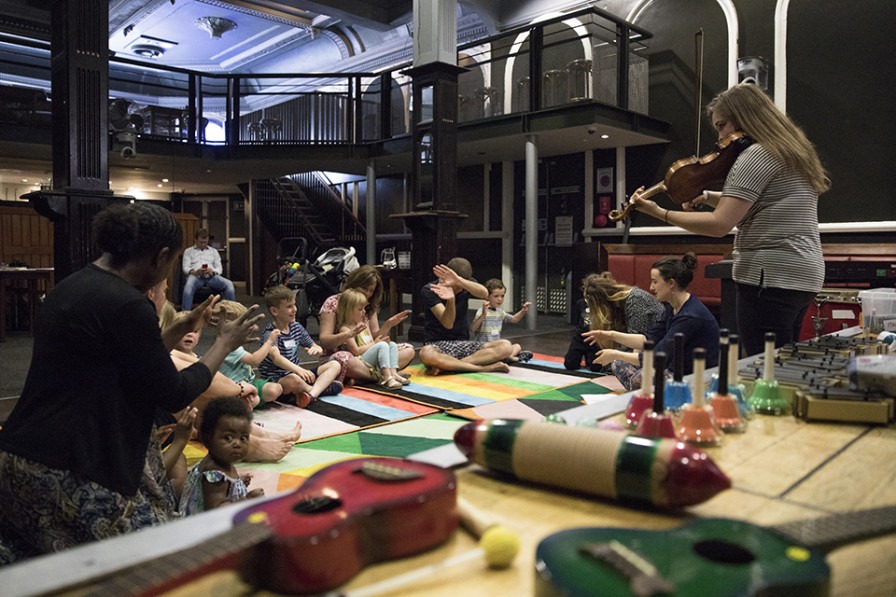The benefits of music making for children and families

Delia Stevens, percussionist and member of world-folk-fusion quintet Kabantu, blogs about the benefits of music making for children and families.
Junior Jam is a monthly music workshop delivered by Brighter Sound aimed at 4-8 year olds. It was set up following the success of Brighter Sound’s weekly Shake Rattle & Roll sessions aimed at 0-4 year olds. These sessions were extremely popular but there was nowhere to signpost these young children when they outgrew Shake Rattle & Roll. Brighter Sound commissioned Manchester-based world music collective Kabantu to facilitate a monthly workshop for this older age group. The sessions are based on themes from around the globe and building on the participant’s musical skills, whilst exposing them to new sounds and genres.
This is where I come in, as the percussionist in Kabantu and one of the practitioners. We have been running these sessions for about a year now and themes have included At the Movies, Asian Music and Taiko Drumming, Drawing Music, African Choir, ‘Junk Percussion’ and Samba…the possibilities are endless.
I’ve put together a few thoughts about what sessions like this have to offer children and their families:
Community. Music by its very nature brings people together; it requires performers and an audience. Musicians work together to create something beautiful for their listeners and attending a session like Junior Jam is a wonderful opportunity to meet new people outside your immediate environment, interact in new ways through the discovery of music and bond as a family by working together to a shared goal.
Inspiration. Catching children at an early age and exposure might spark an interest in something magical. Some people play Mozart to babies in the womb, and although this might be taking it to the extreme, from our experience as professional classical musicians, the earlier you start, the better. For example, perfect pitch – the ability to name the pitch of any note without any prior reference is a skill that can only be learnt via exposure to music at an early age whilst the brain is still developing.
Confidence. The mixture of performing alone, in a pair, interacting with parents and other children. Music requires you to be a leader, a creator, a follower, a team player, a listener, a performer…and although it can take a while to perfect, you do get the instant gratification of creating live sound.
Inventiveness. Children are so playful and creative by their very nature and exploring the world around them via music can yield amazing results and build on shaping these skills to create a very positive output.
Improvement in concentration. Music can be completely absorbing; it has the potential to be totally engaging as it is simultaneously visual, physical and audible, and is even used as a distraction technique to redivert your attention from pain in hospital settings.
Communication. A chance for children to create, express themselves and interact with each other using an alternative to speaking or writing which can often overcome many barriers. Music is an incredible “glue” that can bring people together, regardless of background, language or disability. It is a wonderful tool that can change the atmosphere in the room immediately and encourage conversations (be they musical or verbal) which otherwise might never have happened. Our work in hospitals, special needs schools, in Kenya and in dementia homes reaffirms this over and over again.
Fun! Music is so satisfying, engaging and entertaining that there simply couldn’t be a better way to spend your Saturday morning as a family!
If you would like to join Junior Jam and become a mini popstar, drummer, singer or composer find out more here.

